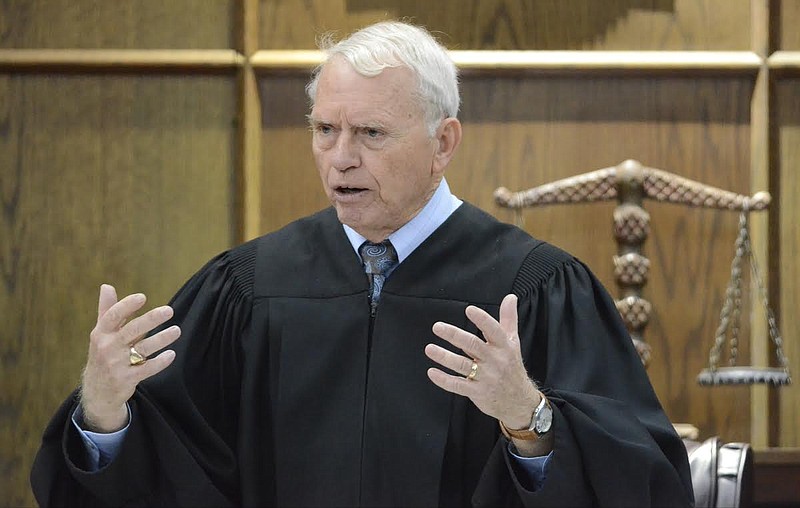A 63-year-old man who was convicted in 2010 of theft of property and burglary of business has asked for a new trial since 2011 - and he has another week to wait before a Hamilton County judge decides how to handle his odd post-conviction appeal.
After listening to several hours of testimony Wednesday in Criminal Court, Judge Don Poole rescheduled Billy Tate's post-conviction hearing to May 25, giving his attorney, Brandy Spurgin, a week to hunt down a pretrial transcript that she believes is helpful.
"The issue now is, is there a missing transcript that never made it to the Court of Appeals?" Spurgin asked. "I'm waiting for the court reporter to get back to me."
Tate's case stems back to March 30, 2009, when Chattanooga Police detective Michael Early was called to Vaughn Equipment Repair to investigate a weekend break-in. The business owner said a thief had pried away the siding on the building and lifted "tools, Cokes [and] miscellaneous other stuff," records show. The owner also pointed out a series of footprints in and around the building.
Early requested another investigator from CPD's crime scene unit to photograph the prints. Then, he ventured over to a "crack house" near the business where he knew "most of the neighborhood thieves hang out," records show.
On several occasions he had been there, records show. And there, after getting permission to enter, Early found Tate sitting in a front room. The detective asked to see his shoes, and Tate agreed. Early determined they were "a positive match to the shoe prints that [were] left at the scene," records show. A witness on scene also identified Tate as the thief.
In June 2010, Early shared this story to a jury after prosecutors took Tate to trial. Several plea agreements had crumbled in the year leading up to the trial, and the jury ultimately convicted Tate on the strength of the credible eye witness for the state, Lorrie Miller, his defense attorney at the time, said Wednesday.
But if a jury believed the story had come to an end, it was only just beginning.
Sentenced to 12 years in the Tennessee Department of Correction, Tate decided to appeal his conviction, with Miller's help, in 2011. A judge rejected the appeal, though, because the entire trial record was never attached.
In a letter to Tate, Miller apologized profusely, saying it was her responsibility to ensure the transcript was attached. She removed herself from the case, the appeal delayed. A new attorney, Stephen Goldstein, was appointed.
Then, in May 2014, Goldstein died.
A year and a half passed before Spurgin filed an amended petition for Tate's post-conviction relief. In the petition, she laid out several concerns of her client, the primary one being Miller, "whose ineffectiveness culminated into a series of errors that ultimately hurt Mr. Tate."
Tate alleged Miller never probed detective Early, who was already investigation; never swept the crime scene or interviewed witnesses; and never argued that his seizure was unconstitutional. He also said Miller failed to argue that his constitutional rights were violated when the state introduced evidence about his shoes.
On Wednesday, Spurgin cross-examined Miller, who shared her defense strategy.
In the months leading up to the 2010 trial, Miller said she met with Tate half a dozen times. She informed him of the state's strong evidence and told him to consider a plea offer. She drove by the scene of the crime (but did not stop to investigate) and checked the backgrounds of the witnesses. Then, when negotiations fell through, she filed several motions that resulted in pretrial hearings. She worried that Tate's footprints were never sent to the Tennessee Bureau of Investigation, that detective Early didn't have forensic backing when he decided the shoes belonged to a man he had arrested before. And she argued vigorously in court, even though a layperson can offer their opinion on whether a footprint matches or not, as prosecutor Charlie Minor pointed out Wednesday.
Miller scored a partial victory before trial, Minor said. Although some evidence could be admitted about the footprints, it had to be limited.
During trial though, when a prosecutor asked Early if the prints matched, the detective said yes. According to Wednesday's testimony, Miller objected. And even though Poole agreed with her objection, it didn't stop the topic from re-emerging.
"She continuously objected and he continuously sustained it and Early kept going back to his match," Spurgin said.
At the end of the hearing, Spurgin told Poole she knew several of these motions had been filed, but that she didn't have a transcript for one of them.
"Do you think it could be of assistance?" Poole asked.
"It could be," Spurgin replied.
Minor argued that in order to be successful in a post-conviction, Tate had to show that Miller's performance was so insufficient, the results of his trial were unreliable.
"She either fulfilled what he said she did not do or, based upon her professional opinion, she rightfully determined it would have been a waste of time," Minor said. "These were all decisions she made that were to Mr. Tate's benefit.
"Even if defense gets the transcript, I don't think it will have any outcome," he continued.
Poole said defense and prosecution can make any additional arguments next week and granted Spurgin a week to locate the transcript. In the meantime, Tate will stay in county jail.
"Mr. Tate," Poole said, "it's going to take a while. Right now, it's best for you to stay here."
Contact staff writer Zack Peterson at 423-757-6347 or zpeterson@timesfreepress.com. Follow @zackpeterson918.
